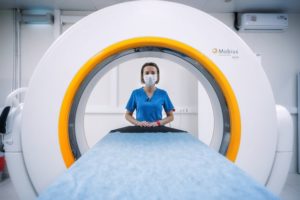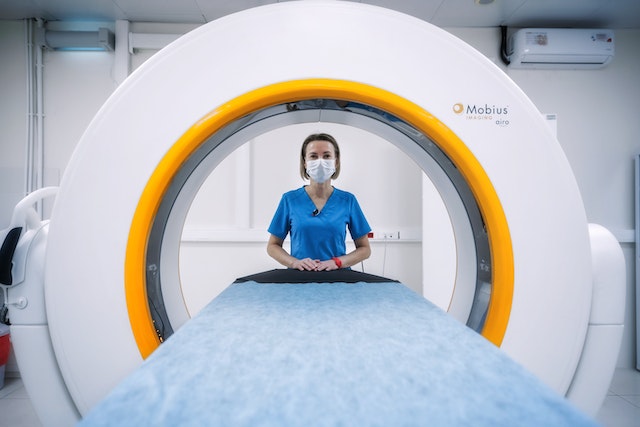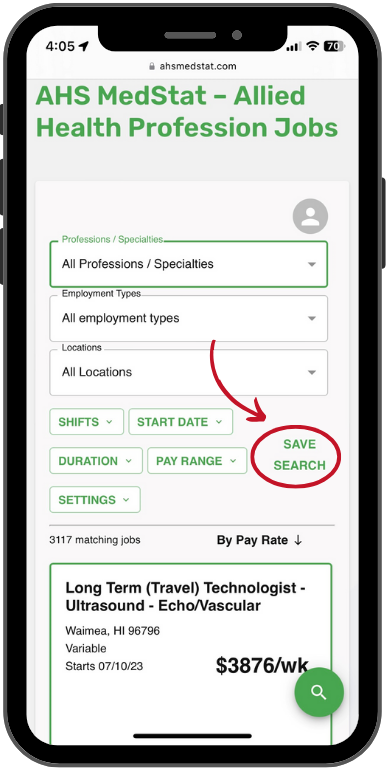Allied health encompasses all kinds of healthcare. There are many types of jobs available as an allied healthcare professional, including radiology tech jobs. These are jobs that allow radiology technologists to help with imaging in a wide range of situations, typically for diagnostic purposes. There are many different specialties in this field, including magnetic resonance imaging (MRI) specialties, which may be the perfect option for many people considering becoming a radiology technologist.

With radiology tech jobs, you can choose many different places to work. One option that can be really beneficial is becoming a traveler. Travel MRI techs enjoy many advantages compared to permanent positions. Traveling can be the ideal way to get the flexibility, freedom, and adventure you want from your career. In this article, we’ll discuss MRI technologists and how you can become a traveling MRI tech.
Get started now – talk to our recruiters or browse our job board to find the perfect job match as a traveling allied health professional.
Types of Radiology Tech Jobs
If you’re considering becoming a radiology technologist, there are many potential careers to choose from. The specialty you choose affects many aspects of radiology tech jobs, including where you’ll work, what you’ll make, and what your daily responsibilities are. Some possible radiology technologist specialties include:
- X-Ray
- Computed tomography (CT)
- Mammography
- Vascular interventional radiography
- Nuclear medicine
- Ultrasound
- Sonography
- Bone densitometry
- Magnetic resonance imaging (MRI)
All of these different specialties have their pros and cons. However, let’s talk more about the last specialty on our list: MRI. MRI techs are some of the highest paid radiology technologists, so let’s discuss them in a little more depth.
Why Consider Radiology Tech Jobs as an MRI Technologist
Why become an MRI tech? There are many reasons. Of course, if you’re exploring potential career options before starting radiology technologist school, there are several things to know.
One is knowing exactly what MRI technologists do. These professionals are part of the allied health industry and help with imaging through magnetic resonance imaging. Unlike many other types of imaging, this does not use or produce any radiation and instead relies on magnetic and radio waves for a clear image. These are commonly used for really clear pictures of internal organs and bones and work particularly well for soft tissues and the nervous system.
Like with other radiology tech jobs, the MRI technologist is responsible for taking images using the MRI machine. This involves injecting patients with a special substance to make the MRI work properly, positioning the patient correctly, and using the machine to take images directed by the doctor. They’ll also explain the procedure to the patient and monitor them during the scan.
MRI techs can work in a variety of settings, just like with other radiology tech jobs. Most often, they work in hospitals and diagnostic labs that have the space and funding for MRI machines, which are large and often quite expensive. Less commonly, they will work in other facilities like outpatient care centers, physician offices, and specialty centers.
Advantages of a Career as an MRI Technologist
Everyone is different, so becoming an MRI tech may be the perfect job for you or it might not be the right fit. There are several advantages to note, though. For instance, MRI technologists often make a good living. According to the U.S. Bureau of Labor Statistics, the average annual salary for an MRI tech is $77,820, with an average hourly wage of $37.41. Of course, this is just the average. In the top five highest paying states for MRI technologists, the average salary is six figures or close to six figures. The top paying states include California, Alaska, Hawaii, Washington, and Oregon.
These professionals are also in quite high demand, creating job security. Job growth for this career is quite high, making these skills desirable. Additionally, with many places backed up due to delays of medical procedures during the first part of the COVID-19 pandemic, there are a lot of patients who need MRIs, further increasing demand.
Often, MRI techs also enjoy a less hectic work environment, as MRIs are generally scheduled for patients in stable condition. So, they’re primarily responsible for caring for specific patients only during the length of the scan.
How to Become an MRI Tech and Take Radiology Tech Jobs
Before you can start radiology tech jobs as an MRI technologist, there are a few steps you’ll need to take. The first is to get your education. Generally, you’ll need two to four years of education to be an MRI tech, earning either your associate or bachelor’s degree. Usually you’ll start education as a radiology technologist and receive extra education specifically for your MRI specialty. Afterwards, you may need to earn a license or a certification, depending on your state’s specific requirements. From there, you can start looking for radiology tech jobs that suit you and build your skills and experience. (You’ll need at least two years of experience to become a traveler with our team.)
Why Consider Allied Health Travel Jobs as an MRI Tech
MRI techs can also take allied health travel jobs all over the country. After all, many facilities need their help to provide care for patients where there are staffing gaps in the MRI department. Travel MRI technologists can enjoy a lot of perks, including high pay, travel, and tons of valuable experience.
Top Paying Travel Radiology Tech Jobs
As we mentioned earlier, MRI techs are some of the top paid professionals in the radiology tech world. However, you can make even more as a traveler. Often, facilities are willing to pay travelers more than permanent staff because they really need to fill a spot until they can find other options, like a new permanent hire. This, plus the tax-free stipends travelers are often eligible for all creates a really lucrative compensation package.
Enjoy Traveling Around the Country
Another great reason to become a traveling MRI technologist is to travel! You might have already guessed this, but many travelers travel all over the country to take radiology tech jobs. That means you can start crossing places off your bucket list and enjoy seeing different places, whether you’re ready to lay out on the beach or hit the ski slopes on your off days.
Gain Experience from a Variety of Radiology Tech Jobs
As a travel MRI tech, you can also get a lot of experience to add to your resume. Because you’re working temporary contracts all over the country, you get to know any different people, policies, and procedures. You’ll also get first-hand experience with things like different EMR software and different MRI machines. This is a huge boost to your resumé and career.
Talk to Our Medical Staffing Specialists at AHS MedStat
If you’re interested in becoming a travel allied health professional, look no further than AHS MedStat. We are a medical staffing agency specializing in allied health. We help professionals like radiology techs, respiratory therapists, and rehabilitation professionals find jobs throughout the nation. Our team understands your goals and what’s important to you to help you find the ideal assignments for you. We also offer ongoing support for everything from credentialing to housing so you can have a great experience with each job you take. Start traveling now by applying through our job board or reaching out to our recruiters directly.


